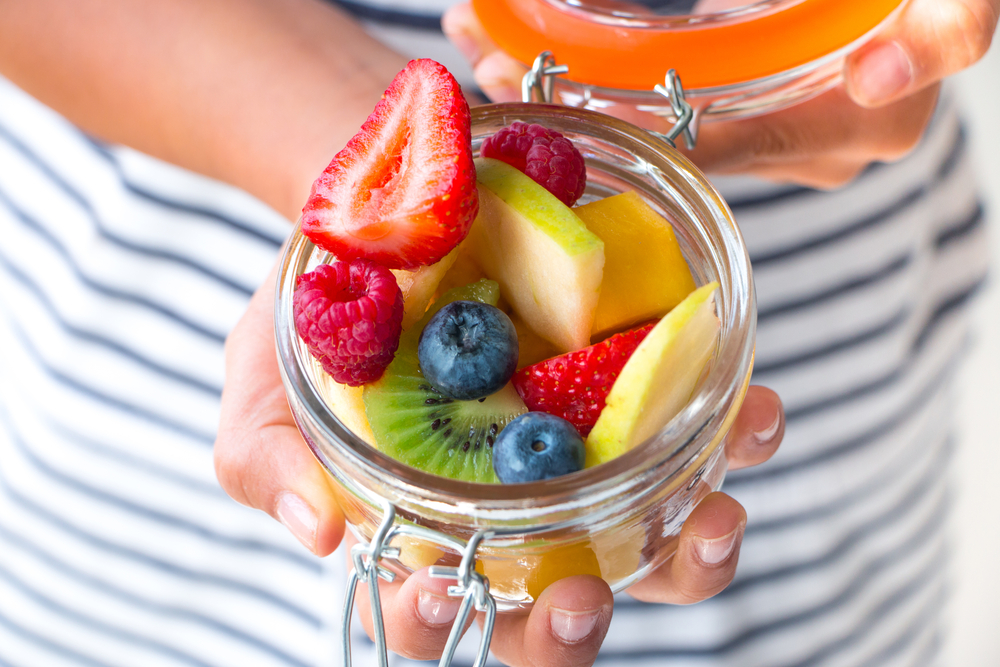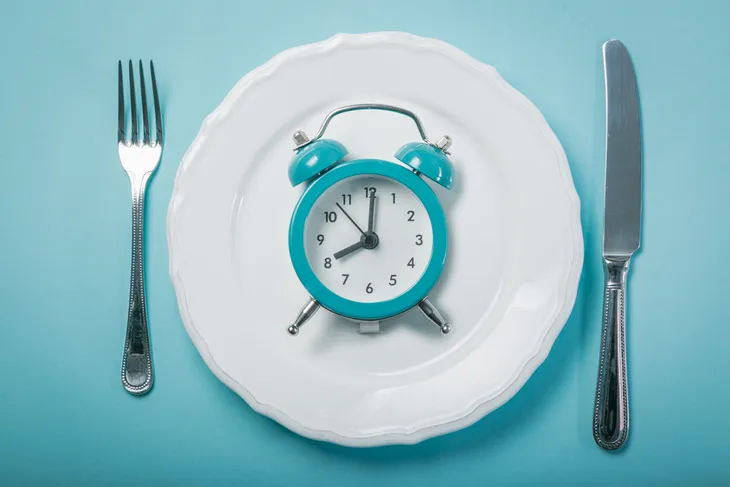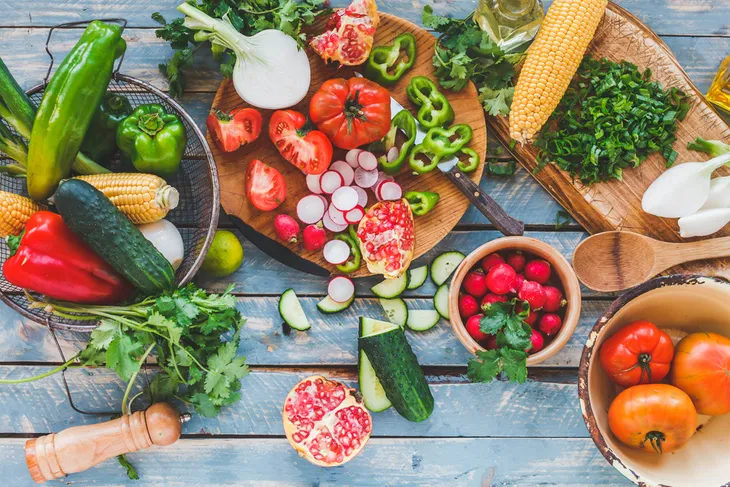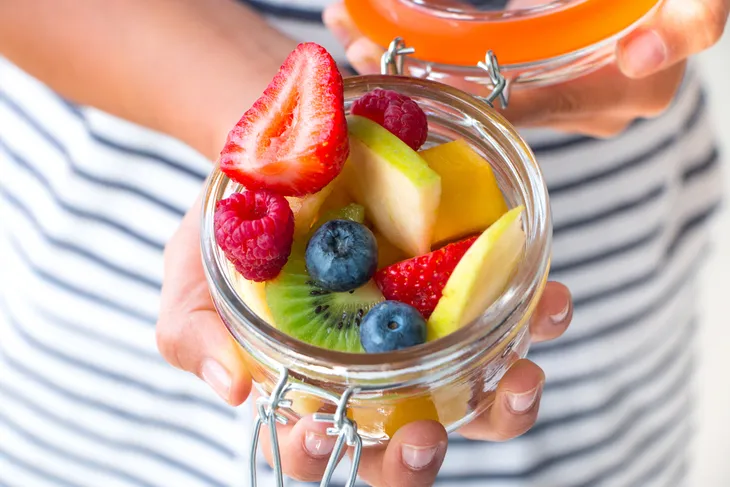- Fruits and vegetables are some of the easiest things to prioritize when cleaning up your diet.
- There are small tweaks you can make to your everyday routine to be healthier.
- You can take advantage of in-season fruits and vegetables in the springtime.
As we usher in a new season, we often succumb to the temptation to declutter and purge more than just our homes and garages. Giving your diet a good spring cleaning—particularly after a winter filled with eating starchy, comfort foods in front of the TV—can really help you adopt a lighter, healthier mindset for the new season ahead. These positive habits can be something you continue to practice as you move throughout the upcoming summer, fall and winter seasons.
Cleaning up your diet will not help you feel better, but have positive impacts on your health. Thes best part is you don’t have to commit to fad diets or difficult routine changes to achieve these benefits.
Here are 12 tips for spring cleaning your diet!
Consume Smaller Portions
Cleaning up your diet not only has to do with what you are eating, but how much you’re eating. LiveStrong says portion control has several benefits, such as:
- Better blood control
- Improved digestion
- Curb cravings
- Weight control
- Saving money
You may feel less inclined to consume heavy, starchy foods for warmth and comfort in springtime and prefer smaller, lighter meals and snacks instead. For example, you may gravitate towards foods such as Greek yogurt and fresh fruit for breakfast instead of a heavy bowl of oats or granola.
Eat More Often
Rather than eating three large meals per day, you might want to try having to try eating smaller portions more often. The Cleveland Clinic says mini-meals can help to keep you energized because your blood sugar levels remain stable throughout the day.
Eating more frequently also means you’re less likely to binge mid-day because you’re starving. Plus, smaller and more frequent meals can help make your metabolism be more efficient. This allows the body to effectively use carbs, protein and fat to fuel it.
Hydrate to Detox
Did you know that majority of Americans aren’t drinking enough water? The Chicago Tribune reports that 43 percent of adults drink less than four cups of water each day. While there isn’t an official number of cups recommended by the Centers for Disease Control and Prevention (CDC), four cups isn’t enough for most people.
We should drink more fluids during the warmer months. The CDC says it helps you stay hydrated throughout the day and prevent heat illness. In addition to water, herbal teas (both hot and iced) and fresh fruit juices can aid hydration.
Cut those Carbs
Spring is the perfect time to cut back on carbs and take advantage of seasonal fruits and vegetables. Suddenly we have access to more local fruits and vegetables than usual, which means we can indulge in less starchy, processed, protein, and fat-heavy meals.
While you don’t have to cut carbs completely, there are some perks to cutting back. Healthline says some of the benefits may include abdominal fat loss, improved “good” HDL cholesterol levels and lower blood pressure.
Get Imaginative with Color
Go for a colorful plate of fruits or vegetables. Not only does it make any meal more appealing; the spring season means you’ll have access to more in-season, local produce at farmer’s markets and grocery stores.
There is a long list of fruits and veggies in season for spring. The ingredients are super easy to incorporate into meals and even snack on throughout the day. Some of them include:
- Avocados
- Spinach
- Kale
- Bananas
- Strawberries
- Radishes
- Pineapples
Eat to Energize
Spring cleaning your diet typically means you’ll consume more vitamins and natural foods in your diet—which naturally leads to more energy and potential weight loss as well. There are plenty of foods that will help power you throughout the day.
Wondering which foods are packed with nutrients to give you all-day energy? Here are some examples:
- Apples
- Dark berries such as blueberries, raspberries and blackberries
- Eggs
- Yams and sweet potatoes
- Beets
- Fatty fish such as salmon, sardines and tuna
- Oatmeal
- Nuts
Eat Raw
A diet full of whole and organic foods is something to prioritize in the springtime. Medical News Today says a focus on fruits and veggies will fill your body with nutrients, improve digestion and potentially give you more energy.
There are plenty of foods to safely eat raw. Just venture out to a local farmer’s market and tempt your springtime pallet with the bounty of fresh fruits and veggies available—no oven necessary for delicious meals and snacks.
Go Back to Basics
With so many fad diets and nutrition advice out there, you might not know where to start when cleaning up your diet. The easiest way to clean up your diet is to remind yourself of the dietary guidelines recommended by the CDC. It will help ensure you get the nutrients you need and that you’re indulging in important food groups.
This means consuming foods everyday that include:
- Vegetables (dark-green, starches, beans, peas, lentils, etc.)
- Fruits (fresh, frozen canned, dried)
- Whole grains
- Low-fat dairy
- Protein foods (poultry, seafood, nuts, etc.)
Think Light
Large and hearty dinners are enjoyable, but it can also be beneficial to opt for lighter dinners every so often. ABC Everyday reports that eating smaller meals may help you maintain a healthier weight and reduce the risk of diseases, such as type 2 diabetes.
With a bounty of fresh fruits and veggies available, you’ll certainly be tempted to eat fresher and lighter—making fruit and veggie salads, stir-fries, grilled veggies, and smoothies your meals of choice.
Bid Adieu to Processed Foods
Come spring, suddenly those packaged mini pizzas and frozen fries don’t seem so appealing. However, your palette will certainly crave those fresh meats readily available at your local butcher shop, and fresh herbs, veggies, and fruit at local farms.
There are some health benefits to limiting the amount of processed food in your diet. Health.com says you may feel more energized and focuses, lose weight and potentially crave less processed foods as time goes on.
Limit Added Sugar Intake
One of the best things you can do for your health is limiting the amount of added sugar you consume each day. That’s because too much sugar can lead to poor nutrition, weight gain and increased risk of developing cavities.
The American Heart Association says the average American consumes 77 grams of sugar per day. To stay healthy, it’s recommended that men consume no more than 36 grams per day and women consume no more than 32 grams per day.
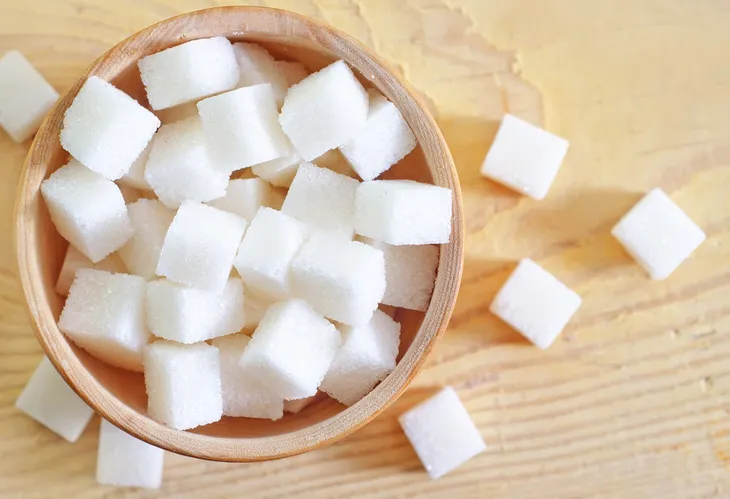 Gayvoronskaya_Yana / Shutterstock
Gayvoronskaya_Yana / ShutterstockDiscover Springtime Recipes Online
With the warmer weather and fresh produce in season, spring is the perfect season to indulge in nutrient-rich recipes. You can take advantage of the fruits and veggies this season brings by visiting your local farmers market. Not only are you guaranteed to have the richest ingredients, but you’ll also be supporting local farmers and businesses.
To get inspired by new meal ideas, start an online search. You can browse through endless recipes that embrace this season’s freshest produce. Customize the search to include recipes with your favorite ingredients, preferred cook time and diet preferences.
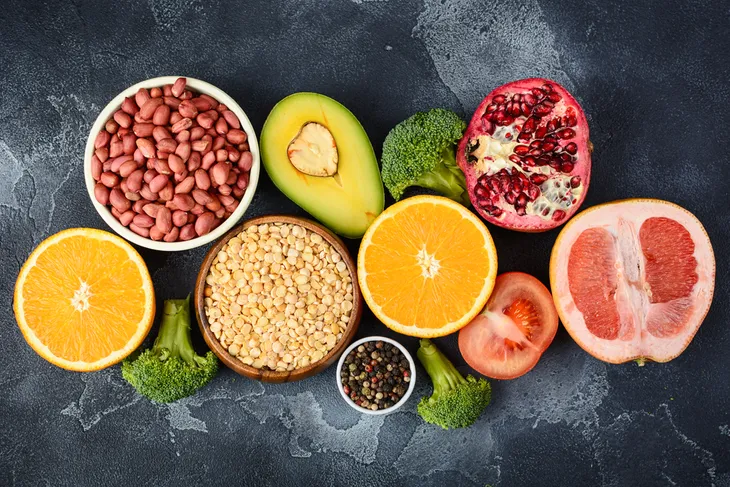 O.Bolo4ev / Shutterstock
O.Bolo4ev / ShutterstockLooking for tips to help you lose weight and eat healthier for spring? Check out these articles:
